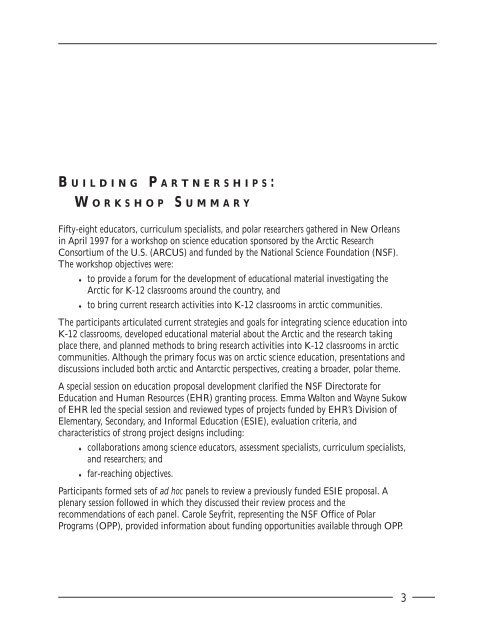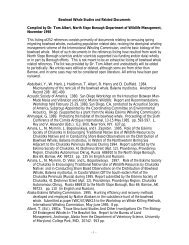ed report 4 page cover - Arctic Research Consortium of the United ...
ed report 4 page cover - Arctic Research Consortium of the United ...
ed report 4 page cover - Arctic Research Consortium of the United ...
You also want an ePaper? Increase the reach of your titles
YUMPU automatically turns print PDFs into web optimized ePapers that Google loves.
B U I L D I N G P A R T N E R S H I P S :<br />
W O R K S H O P S U M M A R Y<br />
Fifty-eight <strong>ed</strong>ucators, curriculum specialists, and polar researchers ga<strong>the</strong>r<strong>ed</strong> in New Orleans<br />
in April 1997 for a workshop on science <strong>ed</strong>ucation sponsor<strong>ed</strong> by <strong>the</strong> <strong>Arctic</strong> <strong>Research</strong><br />
<strong>Consortium</strong> <strong>of</strong> <strong>the</strong> U.S. (ARCUS) and fund<strong>ed</strong> by <strong>the</strong> National Science Foundation (NSF).<br />
The workshop objectives were:<br />
♦ to provide a forum for <strong>the</strong> development <strong>of</strong> <strong>ed</strong>ucational material investigating <strong>the</strong><br />
<strong>Arctic</strong> for K-12 classrooms around <strong>the</strong> country, and<br />
♦ to bring current research activities into K-12 classrooms in arctic communities.<br />
The participants articulat<strong>ed</strong> current strategies and goals for integrating science <strong>ed</strong>ucation into<br />
K-12 classrooms, develop<strong>ed</strong> <strong>ed</strong>ucational material about <strong>the</strong> <strong>Arctic</strong> and <strong>the</strong> research taking<br />
place <strong>the</strong>re, and plann<strong>ed</strong> methods to bring research activities into K-12 classrooms in arctic<br />
communities. Although <strong>the</strong> primary focus was on arctic science <strong>ed</strong>ucation, presentations and<br />
discussions includ<strong>ed</strong> both arctic and Antarctic perspectives, creating a broader, polar <strong>the</strong>me.<br />
A special session on <strong>ed</strong>ucation proposal development clarifi<strong>ed</strong> <strong>the</strong> NSF Directorate for<br />
Education and Human Resources (EHR) granting process. Emma Walton and Wayne Sukow<br />
<strong>of</strong> EHR l<strong>ed</strong> <strong>the</strong> special session and review<strong>ed</strong> types <strong>of</strong> projects fund<strong>ed</strong> by EHR’s Division <strong>of</strong><br />
Elementary, Secondary, and Informal Education (ESIE), evaluation criteria, and<br />
characteristics <strong>of</strong> strong project designs including:<br />
♦ collaborations among science <strong>ed</strong>ucators, assessment specialists, curriculum specialists,<br />
and researchers; and<br />
♦ far-reaching objectives.<br />
Participants form<strong>ed</strong> sets <strong>of</strong> ad hoc panels to review a previously fund<strong>ed</strong> ESIE proposal. A<br />
plenary session follow<strong>ed</strong> in which <strong>the</strong>y discuss<strong>ed</strong> <strong>the</strong>ir review process and <strong>the</strong><br />
recommendations <strong>of</strong> each panel. Carole Seyfrit, representing <strong>the</strong> NSF Office <strong>of</strong> Polar<br />
Programs (OPP), provid<strong>ed</strong> information about funding opportunities available through OPP.<br />
3




